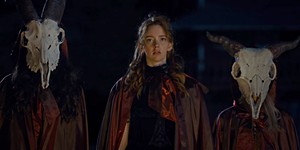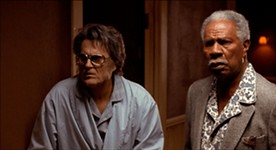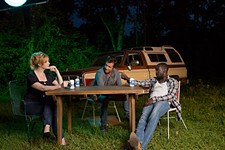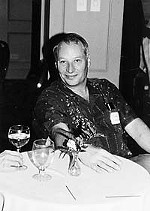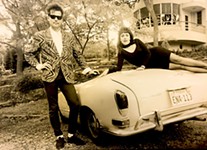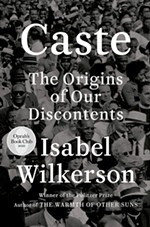Sometimes Rumble, Sometimes Tumble
Joe Lansdale may be Texas' bloody answer to Mark Twain
By Joe O'Connell, Fri., June 26, 2009
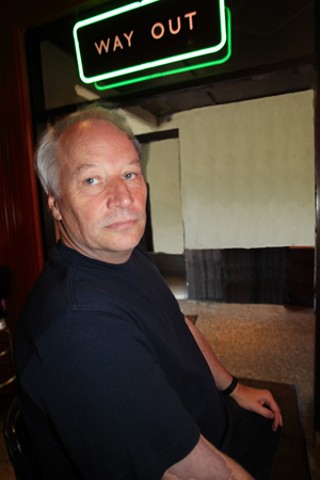
Joe Lansdale was 4 when his father bought him a puppy. The dog soon started digging in a flower bed across the creek from their home, so an irate neighbor cracked the dog across the head with a steel pipe and tossed the limp critter into the creek to die. His father heard the news and marched to the neighbor's house with young Joe tagging along behind. "He hit him just as hard as he could and knocked him cold out," Lansdale remembers. "Then he threw the guy in the creek. My father found the dog, which was alive, and nursed it back to health. I was nearly 18 when that dog died." That moment speaks volumes about the man and the writer Lansdale would become while staying ever close to his East Texas roots.
Lansdale, 57, readily admits that Hap Collins from Vanilla Ride – his first Hap and Leonard crime novel in eight years – is his alter ego. An idealistic but jaded former Sixties activist with both a liberal bent and a blue-collar lifestyle, Hap teams with Leonard Pine, a gay, black Vietnam vet, to whoop ass and take names in a series of East Texas-set novels, of which Vanilla Ride is the seventh. (The entire back catalog – including Savage Season, Rumble Tumble, and Captains Outrageous – was just re-released by Random House, and an eighth book is in progress.) Lansdale, who briefly attended the University of Texas, opposed the Vietnam War so strongly that he refused to go when drafted. Like Hap, he worked a string of dead-end jobs – digging ditches, tarring roofs, working the door at a nightclub, toiling in a mobile-home factory – before the writing gig paid off. He's an Obama fan who is angered by the intolerance of organized religion. Leonard, meanwhile, is inspired by three black friends, one of whom was gay, and allows the other side of the Vietnam story to get its say. Lansdale's brother John, older than him by 17 years, served in Vietnam.
At age 11, upon returning to his hometown of Gladewater after a few years in Mount Enterprise, Lansdale got a glimpse of a rough-and-tumble world that lives on in his fiction. "A lot of people grew up there when it was the oil boom, and the oil boom boomed out," he says. "It had lots of prostitutes and oil workers. It had a tough reputation, and it deserved it." A smart kid and, worse yet, a reader, Lansdale got picked on a lot, but his father was a boxer and wrestler and started teaching Joe, who then expanded that into martial arts. "I turned out to be a tough smart kid," says Lansdale, who founded the Shen Chuan system and runs a martial arts school near his home in Nacogdoches.
His novels are ultraviolent, fast-paced, and fun, but on closer inspection they reveal a collage of Lansdale's influences – from the pulpy to the literary. His mother sold World Book encyclopedias and gifted young Joe one birthday with a collected Shakespeare edition, a Tarzan book, and the stories of Rudyard Kipling. "My mother wanted me to be a reader," Lansdale says. "She was a reader. Even though she had an 11th-grade education, she was curious about all kinds of things – archeology, anthropology. When I discovered [Tarzan author] Edgar Rice Burroughs, I went nuts. I absolutely had to be a writer. I was the right age at the right time." Lansdale was a brainy kid prone to reading everything from Homer's The Iliad and The Odyssey to Batman comics to Jack London and Mark Twain.
If any current American writer is successfully delving into Mark Twain's territory, it's Lansdale, who doesn't flinch at examining our society's often schizophrenic views of race, religion, and homosexuality. "Racism probably had the biggest impact on me as a person and as a writer," Lansdale says. "When I was growing up in the Fifties and Sixties, racism was an accepted aspect. I had no idea the word 'nigger' wasn't how you referred to black people until I was probably 9 or 10 years old." A turning point was going to the Cozy Theater in Gladewater as a kid to see a movie. Lansdale noticed a stairway that led up the back of the theatre for black patrons. "I asked my mom, 'Why are all these people going in back there?'" Lansdale says. "She told me: 'I can't explain it. It isn't right, but it will change someday.' I always remembered that." His father, who grew up in an era where black people were the "boogie man," provided an interesting contrast. "My father had the most horrible racist rhetoric you ever heard, but he treated people all the same," Lansdale says. "I remember this rainstorm. A car broke down with these black people in it, and nobody would stop. My dad was a mechanic. He fixed the car for nothing. I remember looking at him when he got back in. He said, 'Well, they got those kids in the car.'"
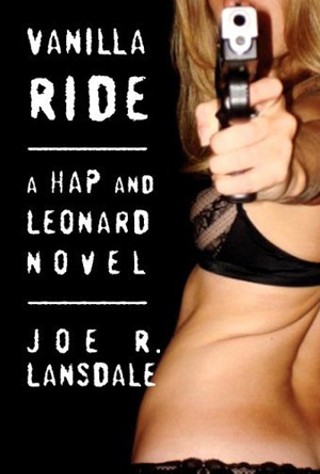
That sense of doing the right thing is at the core of Hap and Leonard. They repeatedly stumble into trouble that is decidedly small-time – Vanilla Ride begins with the duo forcefully extracting a friend's daughter from a mobile home full of low-life drug dealers. "I read in the paper about these people selling drugs out of a trailer that were just stupid as sticks," he says. "Those people interest me the most." Lansdale's work, which has delved into and jumbled up together science fiction, Western, horror, and crime, always stays close to his East Texas home. "East Texas is a different gene pool, sometimes a mixed gene pool," he says. "I love it there, though. I like the people. I grew up in a tough town, and a lot of what I write about is real. That doesn't mean all of the extraordinary aspects of the stories are real, but some of the more extraordinary aspects are real."
That's also true of the short stories and novel excerpts included in Sanctified and Chicken-Fried: The Portable Lansdale (see "Sanctified and Chicken-Fried: The Portable Lansdale"), a Lansdale collection recently released by the University of Texas Press and edited by Steven Davis of the Southwestern Writers Collection that highlights the stories that made the literary community take note of his talent, even if he himself was sometimes ambivalent. The post-atomic-bomb science-fiction tale "Tight Little Stitches in a Dead Man's Back"? Too dark for the marketplace, Lansdale originally thought. "Bubba Ho-Tep" and its mix of an aged Elvis Presley, a black John F. Kennedy, and a mummy in a nursing home? Too quirky, Lansdale opined. Perhaps the finest piece in the collection is "Night They Missed the Horror Show," which is also certainly Lansdale's harshest look at the cruelty of racism. In it, a group of boys drag a dead dog behind their vehicle, give up their black comrade to racists, and then face their own cruel fates. The story links reality and legend from Lansdale's East Texas upbringing. Lansdale's cousin and his friends did indeed drag a dead dog, for instance. "They found bodies in the river from time to time," Lansdale says. "With that story I really solidified my voice. I think that's another reason I love it so much."
Well, more than half of the stories in Sanctified and Chicken-Fried have been optioned for the big screen, many repeatedly optioned. "Bubba Ho-Tep" has been the real boon, with a big-screen adaptation by Don Coscarelli that Lansdale thought would never happen. Who would think otherwise of a story that opens with Elvis inspecting his penis for signs of pus? "Some people are offended by that. They can go fuck themselves," a smiling Lansdale says, only halfway joking. "I think it's delicious. I love it," he says of the film. "To this day I'm shocked that it came out like it did. Ossie Davis is one of my heroes for civil rights and things like that. Bruce Campbell was my son's favorite actor." Lansdale has no involvement in an on-again, off-again sequel Coscarelli hopes to make, which Lansdale says is more off than on now. "Who knows?" he says. "These things are like zombies themselves. They have a life of their own."
The story grew from a time when his mother was temporarily confined to a nursing home after an accident, while he was having serious doubts about the future of his writing career. He was asked to pen a story for an Elvis anthology and was originally convinced the result was horrible. His editor loved it. "I'm writing about a rest home," Lansdale says. "What they're interested in in rest homes is bowel movements, sex, old age." Elvis? Lansdale's sister-in-law Mary went to school with him, and Lansdale's brother recalls seeing Elvis working in a Memphis movie theatre. "Elvis was the usher with the flashlight showing him to his seat," Lansdale says. "Even then he said, 'Well, that guy was kind of unique.'" And Kennedy's assassination was the sea change for Lansdale's generation. "That's when a lot people think things shifted in America," says Lansdale, who was 12 at the time, "though I think they were always shifting. Each generation has that moment. But certainly things were different after that."
Lansdale grew up on a love of science fiction and horror, both the schlocky and sublime, that either aired on a television series out of Shreveport featuring a witch and as part of The Twilight Zone series or screened at the local drive-in theatre, where he would join his brother and his brother's kids, who were about Joe's age, for outings into the bizarre. He fondly recalls B-pictures such as Attack of the Giant Leeches and The Alligator People. "They had the greatest impact on me that you can imagine," Lansdale says of those films, "and they still echo throughout my work. B-movies have influenced me as much as books in many ways. They seem really crude now, but at the time, when you're growing up with a really wild imagination but a very static life, you'd grasp at every straw that you could."
He doesn't see his mixing of genres as all that odd given that he grew up seeing the same thing on the big screen with cowboy actor Gene Autry going to the center of the Earth to battle robots in The Phantom Empire and rushing back to the surface to sing for children at his Melody Ranch. And Lansdale refuses to be pigeonholed. "I don't have a filter on it," he says. "Part of this is, growing up I didn't know the difference between what was supposed to be good and what was supposed to be bad. Of course, I could say, 'That's badly written; that's badly done.' Growing up I was able to put all these things together – a Batman comic, Edgar Rice Burroughs, Mark Twain, Shakespeare, The Iliad. I began to look around and realize where I live is like Mars. This place I live is like these weird places I've read about, dreamed about. I just didn't know it. In fact, many of the things I thought about in my head are just representational. They're metaphors for what I was seeing around me. The science fiction I've read, the horror I've read is the furniture for the real stuff. East Texas is the real living room I'm living in. I just hadn't really noticed it. When I noticed that, the writing began to change."
These days his writing is as interesting and diverse as his life. He has 30 novels to his credit and dozens upon dozens of short stories, comic books, and screenplays. There's even talk of a musical version of "Bubba Ho-Tep." And he was officially named writer in residence at Stephen F. Austin State University this year. "I'm not as prolific as I seem," Lansdale says. "I've been working 30-something years. I am steady; I'm real steady." He writes three hours a day, five days a week, living the dreams he had as a boy. He's met his idols: Twilight Zone writer Richard Matheson, sci-fi legend Ray Bradbury, Logan's Run author Bill Nolan. In Italy he's a rock-star-like celebrity and was honored for the Hap and Leonard books during an anti-homophobia day. He's co-written stories with his wife, Karen; his daughter Kasey is an up-and-coming singer-songwriter; and his son Keith writes for the Nacogdoches newspaper, so the writing bug may be hereditary. "I think persistence is it more than anything else," he says of his career. "When I write, I do it with an absolute love and enthusiasm. Sometimes more successfully than others, I'm certainly aware. I'm taking what I loved as a child and looking at it through adult eyes."
Knopf will release Vanilla Ride on June 30. Joe Lansdale will appear at BookPeople (603 N. Lamar) on Wednesday, July 8, at 7pm.





